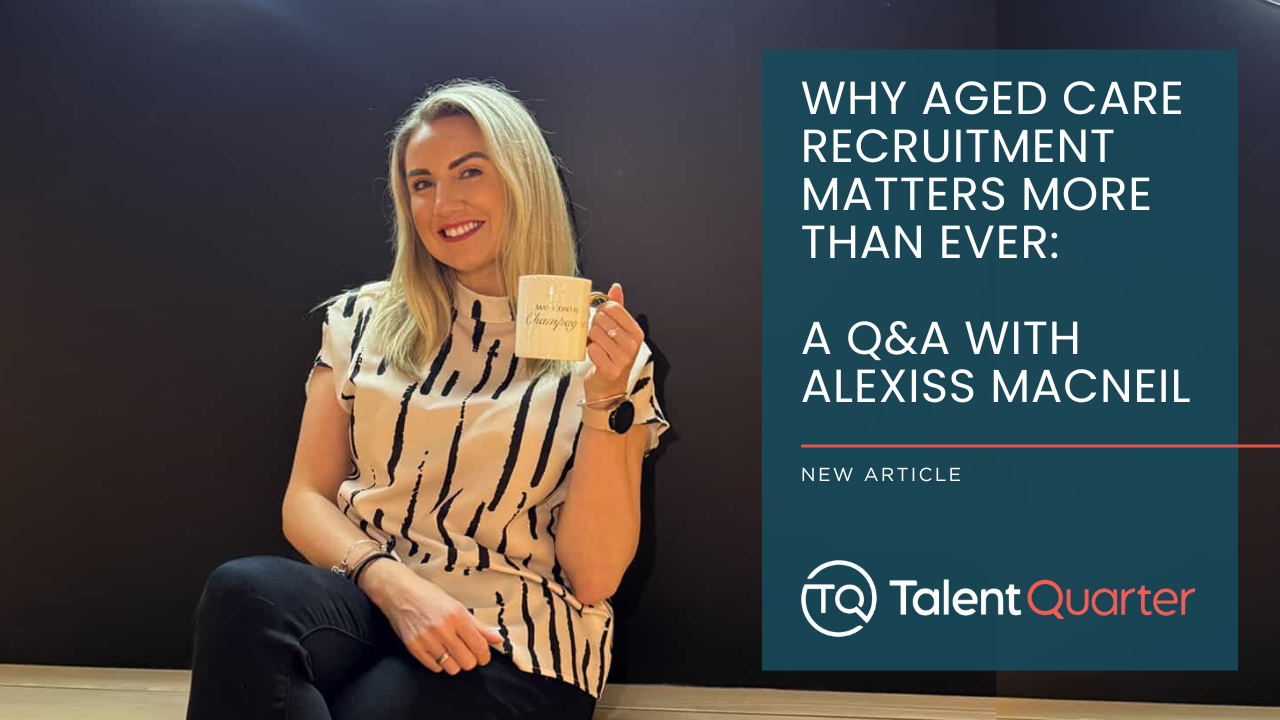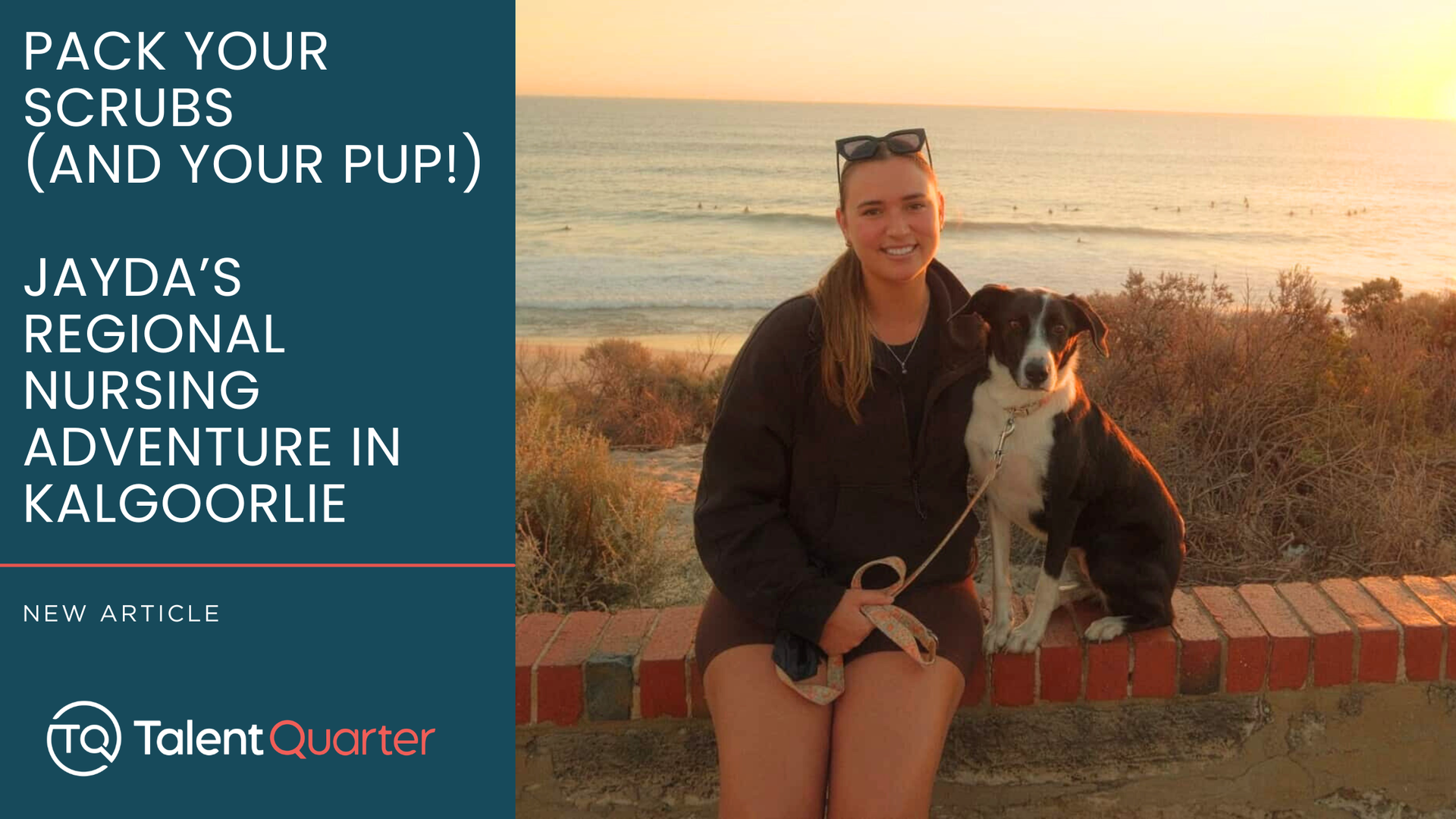Why Aged Care Recruitment Matters More Than Ever: A Q&A with Alexiss Macneil

We know that Aged Care recruitment is about more than filling roles, it’s about dignity, respect, and making sure the right people are in the right place to deliver safe, compassionate care.
To shine a light on this important part of healthcare, we spoke with
Alexiss Macneil, our Head of Aged Care, about why this work matters, how the sector is evolving, and what sets Talent Quarter apart.
Q: Alexiss, what first drew you into Aged Care recruitment?
For me, it comes down to two things: people and purpose. Aged Care recruitment stood out to me because it isn’t just about jobs - it’s about supporting organisations that care for some of the most vulnerable people in our communities. Knowing that the right placement can directly impact the quality of life for residents and their families which makes my role in this incredibly meaningful.
Q: How has the Aged Care sector changed in recent years?
Aged Care is changing on 1 November 2025 with the new rights-based Aged Care Act, which puts older people’s dignity, choice and supported decision-making at the centre - backed by stronger Quality Standards and better whistleblower protections. At the same time, Support at Home replaces Home Care Packages and Short-Term Restorative Care. The person receiving care will be paying for the services they use, with contributions set using age-pension-style means testing (income + assets), and “no-worse-off” protections for anyone who was in the Home Care Package queue before 12 September 2024.
For providers, the bar is higher: clearer obligations, sharper accountability, safer, more people-centred care. The challenge is workforce. That’s where Talent Quarter comes in - supplying compliant, compassionate nurses and care workers you can rely on across residential and in-home care. Our focus is simple: trust, safety and dignity in every placement.
As these reforms come into effect, facilities will need people they can rely on, and nurses and care workers will see clearer pathways and new opportunities, whether in residential facilities or in home-based care. I see our role here as helping both providers and carers thrive in these new circumstances.
Q: What makes Talent Quarter’s approach different?
I don’t see recruitment as transactional; I spend a lot of time building long-term partnerships. While I think our approach is solutions-focused: we look beyond workforce gaps to truly understand the culture and compliance needs of each institution.
Whether it’s permanent, temporary, or international recruitment, we take pride in making sure our support is tailored for both clients and healthcare staff.
We want our clients to feel confident they have the right people, at the right time. Speed, compliance, and cultural alignment aren’t nice-to-haves, they’re essentials.
Q: Why is trust so important in Aged Care recruitment?
Providers are caring for some of the most vulnerable people in our communities, mums, dads, grandparents, people who deserve to feel safe and respected every single day. In Aged Care, there is simply no room for shortcuts, because every placement touches a real life. That’s why trust is everything.
Recruitment partners need rigorous compliance processes, of course, but they also need to be compassionate advisors who understand what’s at stake. At Talent Quarter, we never forget the human side of what we do. We build trust not just through transparency and consistency, but by treating every placement as if we were choosing care for our own loved ones we call this #connectionswithimpact.
Q: There are still misconceptions about Aged Care. How do you change the narrative?
Aged Care nursing is so often misunderstood. It’s not ‘just basic care’, it’s leadership, it’s advocacy, it’s problem-solving in moments that really matter. It’s being the bridge between residents, their families, and the wider healthcare team.
The way we change that narrative is by telling the real stories - shining a light on the skill, compassion, and resilience of Aged Care professionals. We need to celebrate their work, highlight their voices, and remind the community that they’re not just providing care, they’re creating dignity, belonging, and home. When people hear those stories, the perception starts to shift.
Q: What does a successful placement look like for you?
For me, a successful placement is never about filling a vacancy quickly - it’s about finding the right fit. On the candidate side, it means a nurse or care worker steps into a role where they feel truly valued, supported, and able to grow. It’s seeing them thrive, build confidence, and deliver the best possible care because they’re in an environment that is best suited for them.
For our clients, success looks like having a reliable team member who integrates well, strengthens culture, and stays for the long term. The way we get there at Talent Quarter is through empathy and communication, listening to what candidates truly want in their careers, understanding what clients really need, and building genuine partnerships that bring both together.
Q: What keeps you motivated in this challenging sector?
Honestly, it’s the impact we have on people’s lives. When a nurse or care worker finds the right role, they’re not only supported to thrive, but the people they care for feel that impact too. That ripple effect from candidates to clients to the communities they serve - is what inspires me every day. For me, that’s what our TQ slogan #connectionswithimpact is all about.
Your Scottish accent is a bit of a trademark here at TQ! If you had to give us one Scottish phrase, what would it be?
I’d say ‘Whit’s fur ye’ll no go by ye’ - which means” what’s meant for you won’t pass you by.” I love it because it’s a reminder that the right opportunity always comes around - and in recruitment, that couldn’t be more true!

Talent Quarter is a trusted healthcare recruitment partner in Australia, connecting qualified nurses, doctors, allied health professionals and carers with organisations in need. We provide locum, permanent, travel and shift-based roles, delivering workforce solutions that strengthen teams, improve retention and safeguard patient care.
LET’S GET CONNECTED
#ConnectionsWithImpact
QUICK LINKS
FIND TALENT
FIND JOBS

Talent Quarter is a trusted healthcare recruitment partner in Australia, connecting qualified nurses, doctors, allied health professionals and carers with organisations in need. We provide locum, permanent, travel and shift-based roles, delivering workforce solutions that strengthen teams, improve retention and safeguard patient care.
LET’S GET CONNECTED
#ConnectionsWithImpact
QUICK LINKS
FIND TALENT
FIND JOBS

In the spirit of reconciliation, Talent Quarter acknowledges the traditional custodians of country throughout Australia and their connections to land, sea and community. We pay our respect to their elders past and present and extend that respect to all Aboriginal and Torres Strait Islander peoples today.
We welcome all cultures, all religions, all colours, all beliefs, all ages, all sizes, all types, all people.

We welcome all cultures, all religions, all colours, all beliefs, all ages, all sizes, all types, all people.

In the spirit of reconciliation, Talent Quarter acknowledges the traditional custodians of country throughout Australia and their connections to land, sea and community. We pay our respect to their elders past and present and extend that respect to all Aboriginal and Torres Strait Islander peoples today.

We welcome all cultures, all religions, all colours, all beliefs, all ages, all sizes, all types, all people.
Talent Quarter. All rights reserved.
Talent Quarter. All rights reserved.



